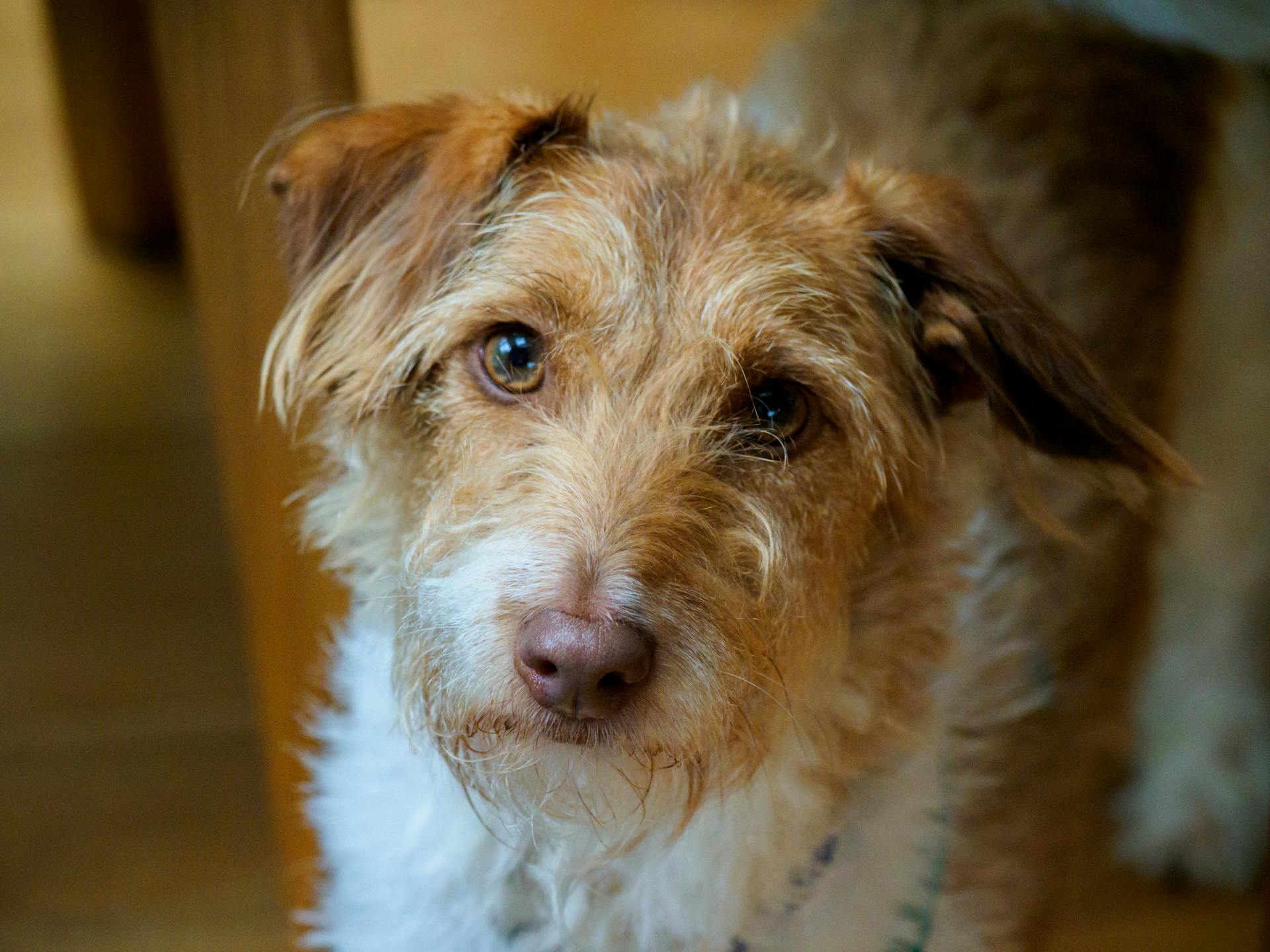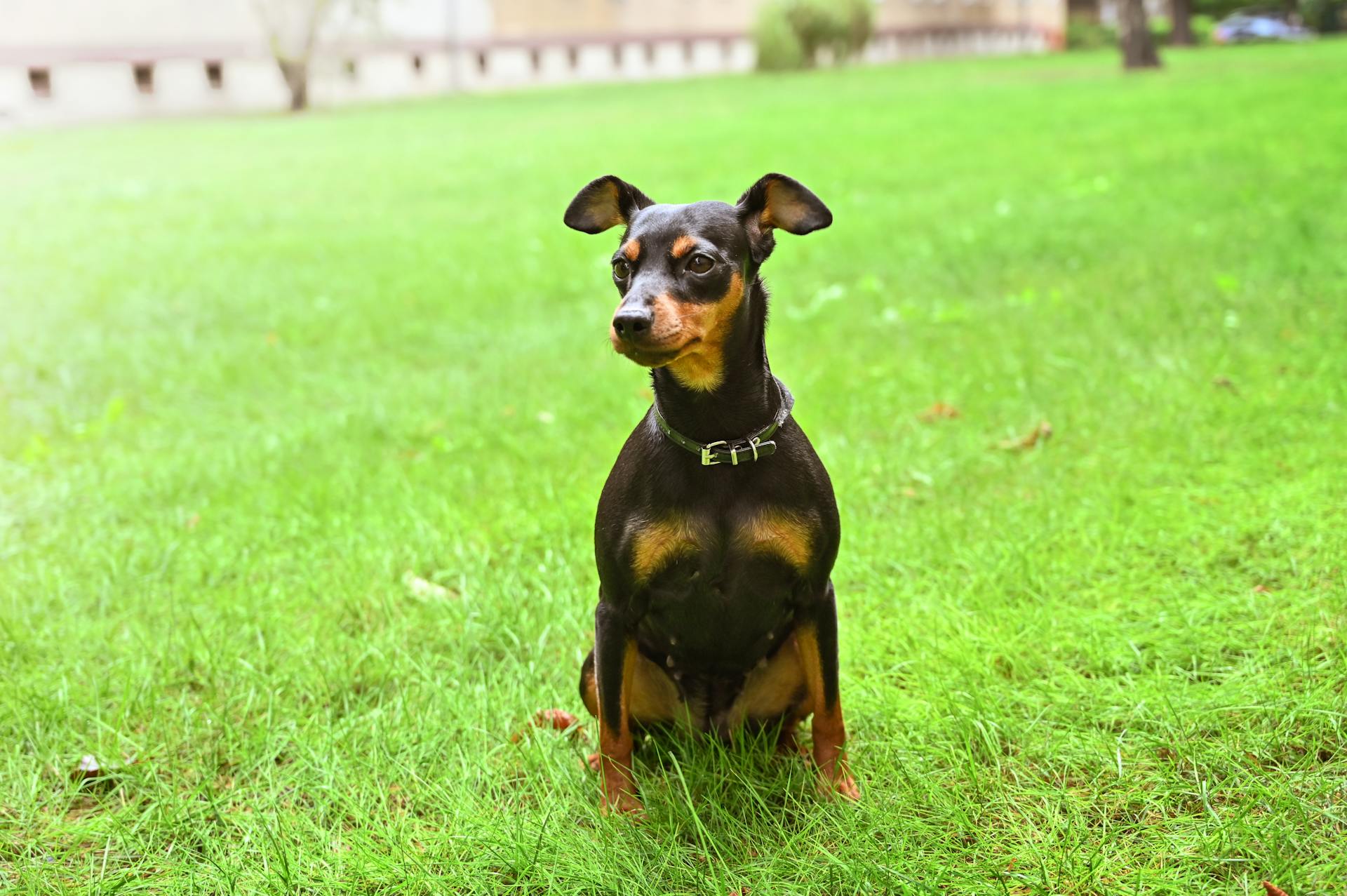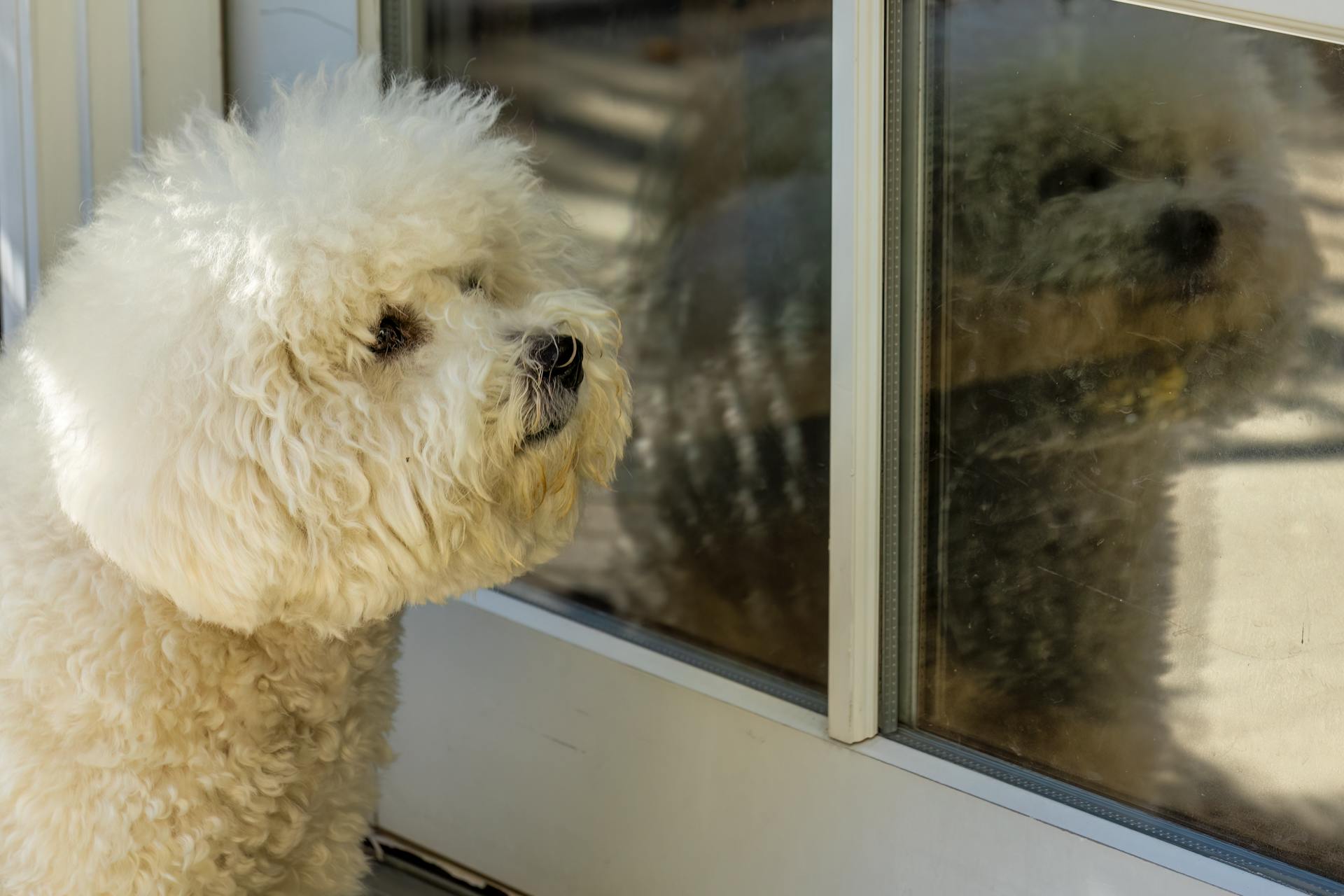
The Portuguese Podengo Pequeno is a small, energetic dog breed that originated in Portugal. They are a rare breed, but their unique characteristics make them a great companion for active families.
These dogs were originally bred to hunt small game, which is why they have a strong prey drive and love to run. They are naturally athletic and require regular exercise to stay happy and healthy.
The Portuguese Podengo Pequeno typically weighs between 8-18 pounds and stands between 10-13 inches tall at the shoulder. Their small size makes them a great choice for apartment living, but they still need plenty of physical and mental stimulation.
Curious to learn more? Check out: Portuguese Podengo Pequeno Puppies
About the Portuguese Podengo Pequeno
The Portuguese Podengo Pequeno is an ancient breed with a rich history that dates back to 1000 BCE, when Phoenician traders brought dogs to the Iberian Peninsula. They were bred to excel at hunting rabbits in Portugal's rugged terrain.
This breed is known for its small size, agility, and keen senses, making it an excellent hunter. Traditionally, they were used for hunting rabbits, and their sharp senses ensured they rarely missed their mark.
The Portuguese Podengo Pequeno is a highly adaptable breed that can thrive in both city apartments and country homes, as long as their exercise and mental stimulation needs are met. They require regular play and activity, even in smaller living quarters.
Here are some key characteristics of the Portuguese Podengo Pequeno:
- National Symbol: The Portuguese Podengo Pequeno is one of Portugal’s national symbols.
- Ancient Breed: This breed has ancient origins, with its ancestors believed to have arrived in the Iberian Peninsula with Phoenician traders as far back as 1000 B.C.
- Rabbit Hunter: Traditionally, the Portuguese Podengo Pequeno was used primarily for hunting rabbits, due to its agility, keen sense of smell, and a size that allowed it to chase prey in tight spaces.
- Two Coat Varieties: This breed comes in two distinct coat types – smooth and wire-haired.
- Highly Vocal: The Portuguese Podengo Pequeno is known to be a vocal breed.
- Adaptable Companions: Though historically working dogs, today’s Portuguese Podengo Pequenos are adaptable and can thrive both in city apartments and country homes.
- Rare Outside of Portugal: While the breed is relatively well-known in Portugal, it is still considered a rare breed in many other parts of the world.
History
The Portuguese Podengo Pequeno is an ancient breed with a rich history that spans thousands of years.
Its origins date back to around 1000 BCE, when Phoenician traders brought dogs to the Iberian Peninsula from the Middle East. The breed's ancestors likely interbred with local dogs, leading to the development of the various Podengo sizes.
The Portuguese Podengo Pequeno was specifically bred to excel at hunting rabbits across Portugal's rugged terrain. Its small size, agility, and keen senses made it particularly suited for this task.
The breed became an integral part of rural Portuguese life, valued for its efficiency as a hunter and its amiable nature. It was popular not just as a working dog but also as a companion.
The Portuguese Podengo Pequeno was first recognized by the Fédération Cynologique Internationale (FCI) and later by the Royal Kennel Club (UK) and the American Kennel Club (AKC) in 2013.
The breed is divided into two coat types: smooth and wire-haired. Both are weather-resistant and serve to protect the dog in different terrain.
Here's a breakdown of the breed's recognition:
Overview
The Portuguese Podengo Pequeno is a small dog with a big personality. This breed typically weighs between 9 and 13 pounds and stands between 8 and 12 inches tall.
Their compact size makes them adaptable to a variety of living situations, including apartments. However, they do need regular exercise and mental stimulation to thrive.
The Portuguese Podengo Pequeno has a distinctive appearance, with erect, pointy ears and a sickle-shaped tail. Their coat can be either short and smooth or long and wiry, and they come in a variety of colors including black, yellow, fawn, gray, and chestnut.
Their lifespan is relatively long, typically ranging from 12 to 15 years. This breed is known for being highly vocal, often communicating through a range of sounds, from barks to yips and howls.
Here are some key characteristics of the Portuguese Podengo Pequeno:
- Weight: 9-13 pounds
- Height: 8-12 inches
- Coat: Short and smooth or long and wiry
- Coat Color: Black, yellow, fawn, gray, and chestnut
- Lifespan: 12-15 years
The Portuguese Podengo Pequeno is an ancient breed, with a history that dates back to around 1000 B.C. They were originally bred to hunt rabbits in the rugged terrain of Portugal, where their small size and agility proved to be valuable assets.
Despite their small size, the Portuguese Podengo Pequeno is a robust breed with a dense coat that can handle a variety of weather conditions. However, they do need protection from extreme temperatures and should be provided with plenty of shade, fresh water, and regular exercise.
Overall, the Portuguese Podengo Pequeno is a lively, affectionate breed that can make an excellent family dog. With proper socialization and training, they can form close bonds with family members, including children.
The Origin of Dog Names
The Origin of Dog Names is a fascinating topic, and it's no exception for the Portuguese Podengo Pequeno.
The breed's name has undergone a transformation through history, as evident in the Portuguese Podengo breed's other name, Warren Hounds in England.
Physical Characteristics
The Portuguese Podengo Pequeno is a small, yet robust dog breed with a unique appearance.
The breed comes in three sizes: Small, Medium, and Large, with both smooth and wire coat types.
The smooth coat is short and very dense, while the wire coat is long and harsh, with a rough texture.
The coat is without undercoat and requires no trimming or sculpting.
The Portuguese Podengo Pequeno typically measures between 8 and 12 inches tall at the withers, and weighs between 9 and 13 pounds.
This small dog has a harmonious build that indicates its agility, stamina, and robustness.
The body is slightly longer than the dog's height, giving it a rectangular shape.
Intriguing read: Miniature Wire Fox Terrier
The breed is sturdy and solid without appearing heavy, emphasizing its origins as an agile hunter.
The head of the Portuguese Podengo Pequeno is a quadrangular pyramid shape, with erect ears and a sickle-shaped tail.
The ears are long, erect, and triangular in shape, set high and tilted forward.
The muzzle is straight and shorter than the skull, tapering but not so much as to create a point.
The nose is tapered and complements the coat's color, typically being black or darker shades of brown.
The tail is set medium-high on the topline, thick at the base, and tapering towards the tip.
It is lightly feathered on the underside and is an expressive part of the breed, often wagging vigorously when the dog is excited or alert.
Here are the possible coat colors and markings for the Portuguese Podengo Pequeno:
- Yellow or fawn in shades ranging from light to medium to dark
- Solid-colored dogs are common as are those with white markings and white dogs with colored markings
- Black or brown coats are acceptable, but not preferred
Head and Body
The Portuguese Podengo Pequeno's head is a remarkable feature of this breed. Its flat skull is relatively flat between the ears, gradually narrowing towards the eyes. The expression is lively and inquisitive, mirroring the breed's alert and intelligent nature.
A fresh viewpoint: Flatcoated Retriever Puppy
One of the most distinctive features of the Portuguese Podengo Pequeno is its ears. They are long, erect, and triangular in shape, set high and tilted forward, contributing significantly to the breed's alert appearance.
The muzzle is straight and shorter than the skull, tapering but not so much as to create a point. It is strong, without being coarse.
The nose is tapered and complements the coat's color, typically being black or darker shades of brown. It is well-defined, with wide nostrils.
The Portuguese Podengo Pequeno's bite is a scissor bite, where the upper incisors closely overlap the lower incisors. Upper and lower jaws should have normal occlusion.
The body of the Portuguese Podengo Pequeno is not explicitly described in the provided article sections, so we'll focus on the head features for now.
Care and Considerations
Caring for a Portuguese Podengo Pequeno requires patience, consistency, and understanding. They are naturally curious and eager to explore their surroundings, making it vital to create a safe and stimulating environment for them.
Puppy-proofing the home by removing potential hazards and providing a range of suitable toys can help to channel a pup's energy and satisfy its need for mental stimulation. Nutrition is fundamental at this life stage, and feeding a high-quality puppy-specific formula ensures the puppy receives the right balance of nutrients to support its growth and development.
Regular veterinary check-ups are essential during puppyhood, ensuring the Portuguese Podengo Pequeno puppy receives the necessary vaccinations, deworming treatments, and health screenings needed to set them on a path towards a healthy adulthood.
To provide optimal nutrition, consider the following feeding guidelines:
Exercise is also crucial for this breed, with a minimum of 1 hour of exercise per day, including daily walks, vigorous running, and regular play sessions.
Puppy Care
Caring for a Portuguese Podengo Pequeno puppy requires patience, consistency, and understanding. These puppies are naturally curious and eager to explore their surroundings, making it vital to create a safe and stimulating environment for them.
Puppy-proofing the home by removing potential hazards and providing a range of suitable toys can help to channel a pup’s energy and satisfy its need for mental stimulation. Nutrition is fundamental at this life stage, and feeding a high-quality puppy-specific formula ensures the puppy receives the right balance of nutrients to support its growth and development.
Early socialization is crucial for the Podengo Pequeno puppy, and exposing it to various people, pets, sounds, and experiences during the formative weeks and months can foster a more confident and well-adjusted temperament. Positive reinforcement during these encounters reinforces good behavior and helps the puppy build a positive association with new experiences.
Training should commence as early as possible, focusing on basic obedience commands like “sit,” “stay,” and “come.” Given the breed’s intelligence and eagerness to please, the Podengo Pequeno puppy often responds well to consistent training methods that use rewards and praise.
Routine veterinary check-ups are essential during puppyhood, ensuring the Portuguese Podengo Pequeno puppy receives the necessary vaccinations, deworming treatments, and health screenings needed to set them on a path towards a healthy adulthood.
Grooming Expectations
Grooming your Portuguese Podengo Pequeno is a relatively straightforward process, but it does require some regular maintenance to keep them looking their best and ensure their skin and coat remain healthy.
You'll need to brush their coat weekly, with the frequency and type of brush depending on their coat type. For smooth-coated dogs, a soft-bristle brush or grooming mitt is sufficient, while wirehaired dogs require a slicker brush or pin brush to remove dirt and prevent matting.
Regular nail trimming is essential, especially if your dog doesn't naturally wear down their nails through activity. Check their ears periodically for signs of infection or wax buildup, and clean them gently with a dog-approved ear cleaner when necessary.
Dental care is also crucial, with daily teeth brushing recommended, or at least 2-3 times a week.
Here's a breakdown of the grooming requirements:
Unless your dog is extremely dirty, they'll only need a bath every 3 months, and it's essential to use a dog-specific shampoo that suits their skin type.
By following these grooming expectations, you'll be able to keep your Portuguese Podengo Pequeno looking and feeling their best.
Ownership and Lifestyle
The Portuguese Podengo Pequeno is a lively breed that thrives in a variety of environments, from small apartments to homes with yards. They can adapt to a variety of living situations, but they do need regular exercise and mental stimulation to prevent boredom and destructive behavior.
To ensure your Portuguese Podengo Pequeno gets enough exercise, consider long daily walks and having a spacious fenced-in backyard. If you don't have a yard, you can still provide regular playtime and activity in a smaller living space.
A securely fenced yard can be a bonus for this breed, offering them a safe space to explore, play, and release their pent-up energy. However, even in smaller living quarters, provisions for regular play and activity are essential for their well-being.
Owning a Dog
Owning a dog can be a wonderful experience, but it's essential to consider the needs and characteristics of the breed you're interested in. The Portuguese Podengo Pequeno, for instance, is a lively and energetic breed that thrives in a variety of environments, from small apartments to homes with yards.
Their compact size and agility make them an ideal choice for families with children, as they are known to form close bonds with family members. However, early socialization and consistent training are crucial to ensure they fit seamlessly into a family setting.
One of the benefits of owning a Portuguese Podengo Pequeno is their intelligence and eagerness to please, which makes training relatively easy. They are quick to pick up tricks and commands, but training sessions should be short and fun to keep them interested and eager.
If you're considering adopting a Portuguese Podengo Pequeno, be prepared for the possibility of traveling to find a reputable breeder, as there aren't many in North America. It's also essential to research responsible breeders and ensure they take excellent care of their dogs.
In terms of exercise, the Portuguese Podengo Pequeno requires substantial exercise, which can be met with daily playtime and activity. They also need mental stimulation, which can be provided through puzzle toys and interactive games.
Here are some key characteristics of the Portuguese Podengo Pequeno breed:
- Height: 20-30 cm (8-12 ins)
- Weight: 4-6 kg (9-13 lbs)
- Energy level: High
- Intelligence: High
- Trainability: Easy
- Socialization: Crucial for good behavior
Overall, owning a Portuguese Podengo Pequeno can be a rewarding experience for active families who are willing to provide the necessary exercise, attention, and training.
Clubs

Joining a breed-specific club can be a great way to connect with other owners and enthusiasts of the Portuguese Podengo Pequeno.
These clubs are dedicated to promoting and protecting the breed, and they often provide valuable resources on breed care, training, and health.
The Portuguese Podengo Pequenos of America, Inc. (PPPA) is the premier club for the breed in the United States, offering a platform for members to engage in activities, shows, and discussions related to the Podengo Pequeno.
Membership to these clubs can come with access to exclusive events and educational materials, as well as a community of like-minded individuals who share a passion for the breed.
The Portuguese Podengo Club of Great Britain offers a dedicated community for breed enthusiasts, providing guidance on breed standards and organizing events.
If this caught your attention, see: American Kennel Club Lancashire Heeler
Frequently Asked Questions
Are Portuguese podengos rare?
Yes, the Portuguese Podengo is a rare breed. Its rarity is one of the reasons it's often compared to other less common hound breeds.
Do Portuguese Podengo bark a lot?
Yes, Portuguese Podengos are known to be alert barkers, warning their owners of suspicious activity with furious barking
Are Portuguese Podengos smooth haired?
Portuguese Podengos can have either smooth or wire coats. Their coats can vary in color and pattern, including solid colors and white markings.
Are Portuguese Podengos good with kids?
Portuguese Podengos are generally good with children, especially older kids who can understand and respect their boundaries. They can make great family pets for families with older kids who know how to interact with them gently.
What is the life expectancy of a Portuguese Podengo Pequeno?
The Portuguese Podengo Pequeno's average lifespan is 15-17 years. This small but lively breed is known for its hardiness and makes a fine companion.
Sources
- https://showsightmagazine.com/dog-breeds/portuguese-podengo-pequeno/
- https://www.dogster.com/dog-breeds/podengo-portugueso-pequeno
- https://www.dogster.com/dog-breeds/portuguese-podengo
- https://www.dogsnsw.org.au/Breeds/browse-all-breeds/211/Portuguese-Podengo-(Small)/
- https://www.thesprucepets.com/portuguese-podengo-pequeno-dog-breed-profile-4783579
Featured Images: pexels.com


